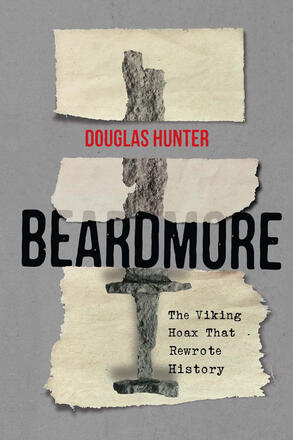
Beardmore
The Viking Hoax that Rewrote History
How the sensational discovery of a Viking grave in northern Ontario became a major museum controversy when it was exposed as a hoax.
Description
In 1936, long before the discovery of the Viking settlement at L’Anse aux Meadows, the Royal Ontario Museum made a sensational acquisition: the contents of a Viking grave that prospector Eddy Dodd said he had found on his mining claim east of Lake Nipigon. The relics remained on display for two decades, challenging understandings of when and where Europeans first reached the Americas. In 1956 the discovery was exposed as an unquestionable hoax, tarnishing the reputation of the museum director, Charles Trick Currelly, who had acquired the relics and insisted on their authenticity. Drawing on an array of archival sources, Douglas Hunter reconstructs the notorious hoax and its many players. Beardmore unfolds like a detective story as the author sifts through the voluminous evidence and follows the efforts of two unlikely debunkers, high-school teacher Teddy Elliott and government geologist T. L. Tanton, who find themselves up against Currelly and his scholarly allies. Along the way, the controversy draws in a who?s who of international figures in archaeology, Scandinavian studies, and the museum world, including anthropologist Edmund Carpenter, whose mid-1950s crusade against the find?s authenticity finally convinced scholars and curators that the grave was a fraud. Shedding light on museum practices and the state of the historical and archaeological professions in the mid-twentieth century, Beardmore offers an unparalleled view inside a major museum scandal to show how power can be exercised across professional networks and hamper efforts to arrive at the truth.
Reviews
"Beardmore: The Viking Hoax that Rewrote History could be a Nordic saga; it is a tale of intrigue, power, and conflicts, of heroes and villains. Douglas Hunter has painstakingly examined this hoax, from its soggy origins in a mining claim close to Beardmore, Ontario, until its finale on the curated display shelves of the ROM, in Toronto. Hunter has dug into many archives, sifting through internal memos and correspondence, eyewitness affidavits, scholarly articles, and newspaper reports. He has constructed what he describes as a "detective story," opening with five pages of dramatis personae to help identify who's who. " The Literary Review of Canada
"What makes Beardmore truly intriguing is Hunter's focus on big-picture issues, including toxically deferential academia and the history of museum culture. Hunter describes his focus as being on 'the history of history, or of the ideas in history' - Beardmore is a testament to how that approach, together with a factual retelling of events, can make for a richer reading experience. Hunter has written an excellent book that is engrossing from beginning to end, while also engaging with critical issues that were in play at a time in which Canadian history was very nearly rewritten. " Quill & Quire
"A fascinating story about the alleged discovery of a Viking grave near Beardmore, Ontario, in the 1930s, and the ongoing controversy over its authenticity. Douglas Hunter uses the whole story as an entry point into thinking about disciplinary power, about what stories matter, whose voices count, and to whom. " Christopher Dummitt, Trent University and author of Unbuttoned: A History of Mackenzie King's Secret Life
"Douglas Hunter gives voice to a large, international cast of characters – both the supporters who believed a Viking grave had been found in Beardmore in 1931 and the naysayers who warned of a hoax. Eye-witness testimony, expert opinions, hearsay, and more, preserved in an extensive evidentiary record, cast light on the ins and outs and possible motives animating a coup-turned-scandal that threatened professionals' reputations and attracted scrutiny into the 1950s. " Barnett Richling, University of Winnipeg, and author of In Twilight and in Dawn: A Biography of Diamond Jenness